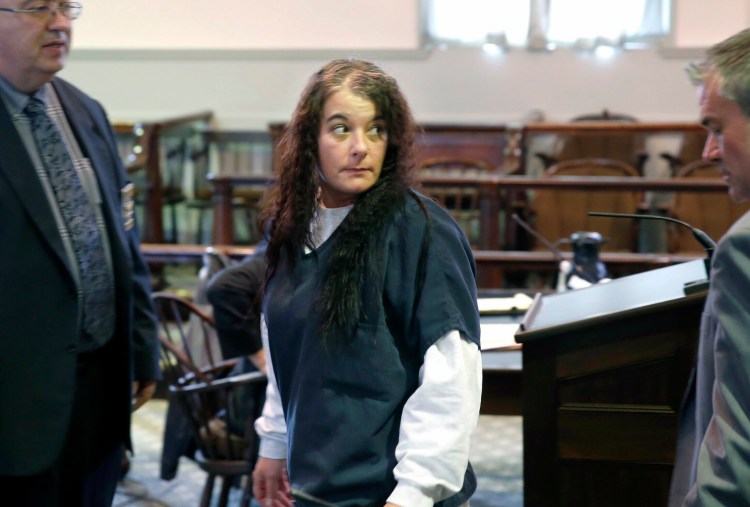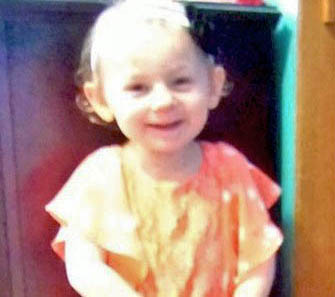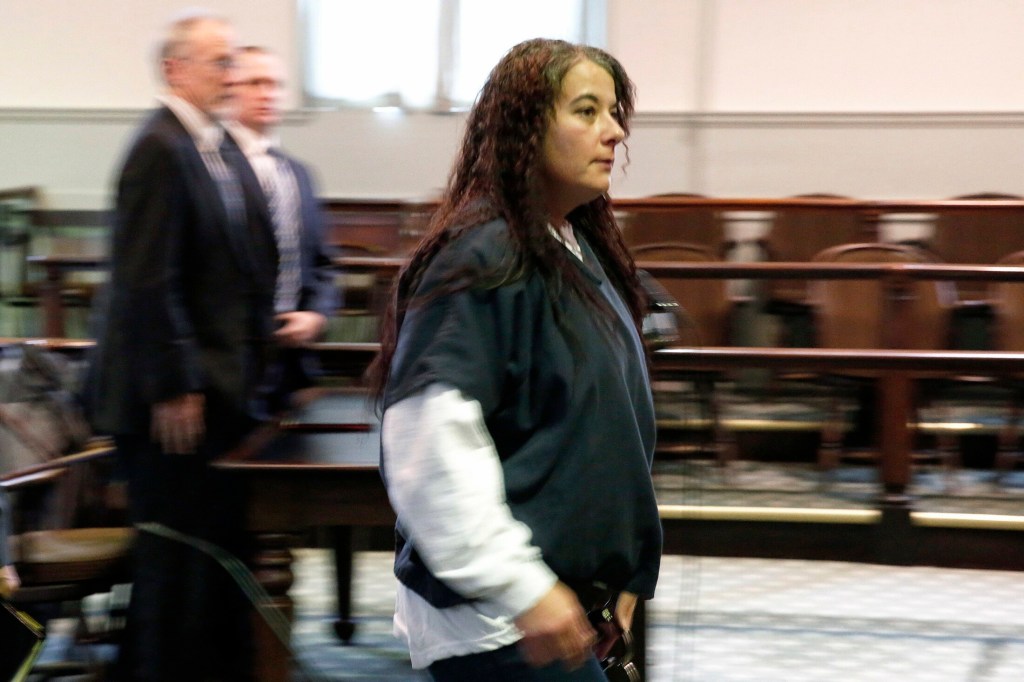Long before anyone could be held to account, the death of 4-year-old Kendall Chick – followed closely by the death of another Maine girl – became a flash point for exposing an overburdened state child protective system.
Chick’s December 2017 death in Wiscasset, coupled with the February 2018 death of 10-year-old Marissa Kennedy in Stockton Springs, spurred both internal and outside investigations that found systemic failures, including high caseworker turnover, inconsistent and sometimes conflicting expectations and an erosion of resources.
The eventual result was $21 million in new Department of Health and Human Services spending for child protection, along with other policy changes. Additional reforms also are being considered in the current Legislature, including a bill that would impose a caseload limit for caseworkers.
On Monday, Chick’s death finally returns to the criminal arena when Shawna Gatto, 44, stands trial for her murder.
Gatto’s trial, at the Capital Judicial Center in Augusta, is expected to last into next week. Her fate will be decided not by a jury of peers, as is her constitutional right, but by Superior Court Justice William Stokes, a former longtime homicide prosecutor for the Maine Attorney General’s Office who became a judge in 2014.
“The reason we opted for a bench trial is because this is a very emotionally charged case and we had concerns with a jury that emotion would dictate their decisions,” said Jeremy Pratt, Gatto’s attorney.
The Attorney General’s Office declined to comment ahead of the trial, but prosecutors are expected to detail horrific injuries Chick suffered leading up to her death and link those injuries to Gatto, the fiancée of Chick’s paternal grandfather and the girl’s primary caretaker.
Pratt and his co-counsel, Philip Cohen, will counter that Chick was an accident-prone child, born to a drug-addicted mother, and that her death was a tragic accident.
The defense also is expected to question the work of State Medical Examiner Mark Flomenbaum, who conducted Chick’s autopsy. He has come under increased scrutiny since he changed his opinion about another murder case in which he was scheduled to testify last month, leading to a mistrial.
Both sides have viewed DHHS records associated with Chick from the moment she was removed from her mother’s care as an infant. How much of that information will be aired in court is uncertain, but the records could provide insight into whether the system failed her.
No matter how the criminal case is resolved, the young girl has become a symbol for a broken system – much like 5-year-old Logan Marr, whose death in 2001 also led to major changes in how the state deals with children who are abused or neglected.
“I do think we’re having a more sustained conversation and there is far more political will than I’ve seen,” said Christine Alberi, the state’s child welfare ombudsman. “It’s unfortunate that children have to die for these conversations to happen.”
DHHS PLACEMENT
According to police reports and court documents, Chick died from injuries she suffered in the hours and/or days leading up to Dec. 8, 2017, when police were called to a home on Cricket’s Lane in Wiscasset.
The girl lived there with her biological grandfather, Stephen Hood, and his fiancée, Gatto.
Chick’s parents – Scott Hood and Alicia Chick – both struggled with substance use disorder and the girl had been removed from their care in the first year of her life.
Gatto referred to Chick as a “drug baby” several times in her conversations with police. She also said that Chick was only supposed to be placed with them for 15 days but that had turned into three years.
Details about whether Stephen Hood and Gatto sought to keep Chick permanently or whether the state was looking for another placement have not been made public. At that time, DHHS favored placements with family members for children who were removed from possible abuse or neglect.
Alicia Chick told NewsCenter Maine last year that she was living in a Portland homeless shelter when she learned of Kendall’s death. She also said she wants to know why the state didn’t do a better job of protecting her.
Gatto, who watched Chick while Hood worked, told police repeatedly that the girl had been fine in the hours before her death. Gatto said Chick had an accident in her underwear – she was potty training – and Gatto had taken her clothes off and put her in the bathtub. She said the girl asked for a drink and when Gatto returned seconds later, she was unconscious.
Gatto and Hood called 911 – both were distraught, according to the call transcript – and an ambulance arrived to take Chick to Mid Coast Hospital in Brunswick. She was pronounced dead there.
An autopsy revealed that Chick suffered blunt force trauma to the abdomen, which caused her death. But the medical examiner also noted other injuries, including head trauma.
Gatto was questioned by police multiple times. She told them she never hit Chick and she doesn’t know what happened. She said the girl was clumsy and often fell down hard. Gatto also said she had trouble communicating, a side effect she believed of being born drug-affected. Hood later told the Maine Sunday Telegram that he didn’t think Gatto was capable of harming the girl and agreed that she was injury-prone.
Detectives, however, wrote in their arrest affidavit that Gatto’s account of Chick’s injuries was not consistent. They also found bloodstains in the house and on paper towels in a trashcan. They charged Gatto a week after the death with depraved indifference murder, a classification that means even if she didn’t intend to cause the death, she acted without regard for the child’s welfare.
Gatto, in a transcript of her conversations with police before her arrest, feared that she would be suspected in the girl’s death and at one point blamed herself for not seeking medical attention for the child sooner.
VOLUMINOUS RECORDS
Gatto was arrested on Dec. 14, 2017, and has been held at Two Bridges Regional Jail in Wiscasset since. Bail was initially set at $250,000 cash but was reduced to $150,000 after her attorneys petitioned. She has not been able to post the reduced bail.
Most murder cases take at least a year to reach trial in Maine, but this case was complicated somewhat by the voluminous DHHS records connected to Chick. Those records are not part of the public case file, but it’s likely that some details will be added to what already is known: she had a rough start to her life.
Before the criminal case got off the ground, Chick’s death put a spotlight on the child protection system in Maine, and the glare brightened in February after Marissa Kennedy’s death. Kennedy, 10, had suffered prolonged abuse over a period of several months, or even years, police have alleged. Her mother, Sharon Carrillo, and stepfather, Julio Carrillo, each have been charged with murder. Their cases are still awaiting trial.
Less than two weeks after Kennedy’s death, lawmakers authorized their watchdog agency, the Office of Program Evaluation and Government Accountability, to investigate. DHHS, under former Gov. Paul LePage, also said that it would conduct an internal investigation.
An initial report from OPEGA in May 2018 found that there were indeed systemic problems exposed by the two deaths, and lawmakers approved a more thorough investigation that has continued into this year.
By late last summer, child protective caseworkers also began speaking out about their unsustainable caseloads, fearing that more deaths could result if things didn’t change. Among the concerns were caseworkers having limited time to check in with families in crisis and others having to spend many nights in hotels with children who had been removed from homes because safe placements could not be immediately found.
LePage responded by proposing a $21 million emergency spending bill to boost pay for caseworkers, improve their computer systems and cut down paperwork. He also pushed for a policy change that shifted priority away from kinship placement. Had that been in place prior to Chick’s death, the state may never have placed the girl with Gatto and Hood.
Alberi, the child welfare ombudsman, said some of the immediate changes that were made in the wake of the two deaths were done hastily and without much dialogue.
“We seem to be engaged in a much more thoughtful process now,” she said.
AUTOPSY FINDINGS CHALLENGED
Even without the backdrop of Maine’s child welfare system in crisis, Gatto’s trial is high-profile because child deaths are rare.
Pratt said he is prepared to call as a witness Dr. Jack Daniel, a forensic pathologist from Maryland, to challenge the autopsy findings of Maine’s medical examiner, Flomenbaum, and raise doubt about whether Gatto caused the injury.
In an unusual twist, Flomenbaum was called as an expert witness in a case in Connecticut three years ago – after he had been hired in Maine – to raise similar doubts about the cause of death of a young child. Flomenbaum testified that he believed a child died of natural causes, not blunt-force trauma caused by the defendant.
The judge in that case was not persuaded and ruled that Flomenbaum’s testimony was not credible. The defendant was convicted and sentenced to 30 years in prison.
More recently, Flomenbaum has come under scrutiny after he changed his opinion in the case of Noah Gaston, who was charged with killing his wife. A judge declared a mistrial and ordered Flomenbaum to explain why he changed his mind.
Pratt said he expected to raise concerns about how Flomenbaum could testify in Connecticut that a child’s death was accidental but couldn’t consider that in Chick’s case.
“For us, there are a lot of unanswered questions that we don’t believe the state can answer,” Pratt said.
The trial could perhaps provide new details about Chick’s early life – how she came to live with Gatto and Hood in the first place and whether there had been a history of abuse.
If Gatto is not convicted of murder, she could be found guilty of a lesser crime, such as manslaughter.
That’s what happened to Sally Ann Schofield in 2002. Schofield was a state child caseworker caring for 5-year-old Logan Marr, who died after Schofield covered her face with duct tape and bound her to a high chair. Her case also was decided by a judge rather than a jury and she was acquitted of depraved indifference murder but convicted of manslaughter.
Stokes, the judge in the Chick case, was the prosecutor for the state in the Schofield trial.
Alberi said Marr remains a symbol for anyone who has entered the child welfare field in Maine over the last 15 years. She doesn’t know if Chick and Kennedy will become lasting symbols, too, but she sees similarities in how policymakers have responded.
Pratt said he understands why Chick’s death attracted so much attention and he also understands the feeling that someone should be held accountable. But he doesn’t believe it’s his client.
“I understand the visceral reaction to the death of a child, but we hope that people can hold back making a judgment about Shawna,” he said.
Send questions/comments to the editors.







Success. Please wait for the page to reload. If the page does not reload within 5 seconds, please refresh the page.
Enter your email and password to access comments.
Hi, to comment on stories you must . This profile is in addition to your subscription and website login.
Already have a commenting profile? .
Invalid username/password.
Please check your email to confirm and complete your registration.
Only subscribers are eligible to post comments. Please subscribe or login first for digital access. Here’s why.
Use the form below to reset your password. When you've submitted your account email, we will send an email with a reset code.